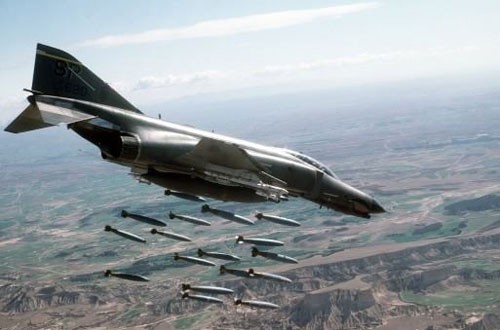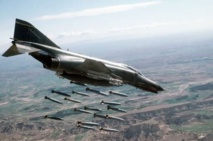"The present situation is not acceptable," said one senior European diplomat. "I detect a growing feeling that we're not winning this at the moment and we need to redouble our efforts collectively."
Western governments are under fierce pressure to tackle a humanitarian crisis that has seen 380,000 migrants and refugees -- including drowned toddler Aylan Kurdi -- voyage across the Mediterranean already this year.
The majority come from Syria.
Four million Syrians have fled a four-year-old civil war, which has seen Bashar al-Assad's government -- backed by Iran and Russia -- bombard rebels and civilians alike.
"A number of Western governments are looking at a combination of the humanitarian crisis, the failure to resolve the situation in Syria and the continued activity... of ISIL (Islamic State) and concluding that we need to do more," the diplomat said.
Until now Iraq has been the main theater for the coalition's $4 billion air campaign against the Islamic State.
Two thirds of the 6,700 airstrikes carried out since August 2014 have taken place inside the country, despite the recent opening of Turkish air bases at Incirlik and Diyarbakir near the Syrian border.
"Now that the Iran nuclear deal is out of the way, people have far more room for maneuver to do something about Syria," said another diplomatic source.
"For Europeans the pressure to be seen acting and to find a solution is stronger."
- Pledges of support -
Officials are now hoping for a fresh show of resolve when coalition members meet on the margins of the United Nations General Assembly later this month.
Coalition countries have already begun to publicly pledge more support, and more is expected.
Australian Prime Minister Tony Abbott on Wednesday announced his country would take part in coalition airstrikes and admit an extra 12,000 refugees.
France has begun carrying out intelligence, surveillance and reconnaissance flights over Syria, paving the way for a more active role.
British Prime Minister David Cameron, having lost a key vote authorizing military force in Syria, is expected within weeks to use his new parliamentary majority to call another.
Cameron also recently revealed that for the first time a British drone had killed three jihadists in Syria, including two British citizens suspected of recruiting for Islamic State.
Both France and Britain have carried out airstrikes in neighboring Iraq.
"Any additional force and any additional firepower to the coalition is looked at positively," said a US military official speaking on condition of anonymity.
Short-term goals are likely to include hitting the Islamic State along the frontline near Marea, a mission officials see as essential to maintaining the flow of humanitarian aid as well as arms and other supplies to rebels.
Jihadists have taken a string of villages near the town, which stands midway between rebel-held Aleppo and the Syrian border.
Intense fighting in the region has included the suspected use of mustard gas by the Islamic State group.
But the exact scope of the new commitments and their possible impact remain unclear.
"National commitments on paper include large caveats about when, where and how countries will use air power," said Micah Zenko of the Council on Foreign Relations.
The measures are unlikely to include the use of ground combat troops, something US President Barack Obama's administration has repeatedly ruled out.
Obama came to office vowing to end costly wars in Iraq and Afghanistan, and has argued against US entanglement in another ground war in a Muslim country.
"Many governments have said there needs to be boots on the ground, but they can't be ours they need to be the local guys," said the senior European official.
Another diplomatic source said the deployment of British or French military advisors was one possibility.
"They don't have the trauma of Iraq as the US has and they have a lot of political pressure," he said, adding that US support, coupled with some boots on the ground, would be vital to the success of the new commitments.
----------------------------------------------------------------------------------------------------------------
Western governments are under fierce pressure to tackle a humanitarian crisis that has seen 380,000 migrants and refugees -- including drowned toddler Aylan Kurdi -- voyage across the Mediterranean already this year.
The majority come from Syria.
Four million Syrians have fled a four-year-old civil war, which has seen Bashar al-Assad's government -- backed by Iran and Russia -- bombard rebels and civilians alike.
"A number of Western governments are looking at a combination of the humanitarian crisis, the failure to resolve the situation in Syria and the continued activity... of ISIL (Islamic State) and concluding that we need to do more," the diplomat said.
Until now Iraq has been the main theater for the coalition's $4 billion air campaign against the Islamic State.
Two thirds of the 6,700 airstrikes carried out since August 2014 have taken place inside the country, despite the recent opening of Turkish air bases at Incirlik and Diyarbakir near the Syrian border.
"Now that the Iran nuclear deal is out of the way, people have far more room for maneuver to do something about Syria," said another diplomatic source.
"For Europeans the pressure to be seen acting and to find a solution is stronger."
- Pledges of support -
Officials are now hoping for a fresh show of resolve when coalition members meet on the margins of the United Nations General Assembly later this month.
Coalition countries have already begun to publicly pledge more support, and more is expected.
Australian Prime Minister Tony Abbott on Wednesday announced his country would take part in coalition airstrikes and admit an extra 12,000 refugees.
France has begun carrying out intelligence, surveillance and reconnaissance flights over Syria, paving the way for a more active role.
British Prime Minister David Cameron, having lost a key vote authorizing military force in Syria, is expected within weeks to use his new parliamentary majority to call another.
Cameron also recently revealed that for the first time a British drone had killed three jihadists in Syria, including two British citizens suspected of recruiting for Islamic State.
Both France and Britain have carried out airstrikes in neighboring Iraq.
"Any additional force and any additional firepower to the coalition is looked at positively," said a US military official speaking on condition of anonymity.
Short-term goals are likely to include hitting the Islamic State along the frontline near Marea, a mission officials see as essential to maintaining the flow of humanitarian aid as well as arms and other supplies to rebels.
Jihadists have taken a string of villages near the town, which stands midway between rebel-held Aleppo and the Syrian border.
Intense fighting in the region has included the suspected use of mustard gas by the Islamic State group.
But the exact scope of the new commitments and their possible impact remain unclear.
"National commitments on paper include large caveats about when, where and how countries will use air power," said Micah Zenko of the Council on Foreign Relations.
The measures are unlikely to include the use of ground combat troops, something US President Barack Obama's administration has repeatedly ruled out.
Obama came to office vowing to end costly wars in Iraq and Afghanistan, and has argued against US entanglement in another ground war in a Muslim country.
"Many governments have said there needs to be boots on the ground, but they can't be ours they need to be the local guys," said the senior European official.
Another diplomatic source said the deployment of British or French military advisors was one possibility.
"They don't have the trauma of Iraq as the US has and they have a lot of political pressure," he said, adding that US support, coupled with some boots on the ground, would be vital to the success of the new commitments.
----------------------------------------------------------------------------------------------------------------









 Home
Home Politics
Politics











